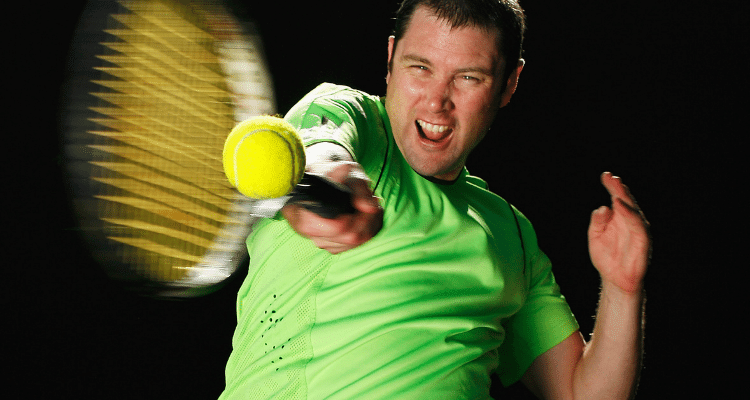While grunting and other sounds are common in all sports, tennis certainly has a bit of a reputation for it.
If you’ve ever watched professional tennis players on television, you’ve heard the loud grunting when the ball is hit.
While it may seem somewhat exaggerated and unnecessary, there are good reasons for all the grunting you hear during a tennis match.
To help you make sense of all this noise, we are going to go over some of the many reasons why tennis players of all skill levels grunt so much when they play.
After you hear some of the practical and scientific reasons for all the grunting you hear at a tennis court, you might even start grunting the next time you play!
Contents
The Top Reasons for Grunting While Playing Tennis
While each player has their reasons and many even claim they cannot control it, the following are just some of the reasons why tennis players grunt while playing:
Grunting Helps with Timing

Tennis is a sport that requires a tremendous amount of focus and hand-eye coordination. To maintain a long rally with a skillful opponent, a tennis player must do everything they can to maintain their focus and timing.
While it may sound a little strange at first, grunting and producing other noises at specific intervals can help with timing control during an intense tennis match.
It lets the player exhale on time and know exactly when they should contact the ball.
Just like weightlifters grunt and exhale audibly between reps when they are lifting heavy weights, tennis players grunt to mark the moment when their racket makes contact with the ball.
Given that the sport of tennis involves an incredible amount of repetition, muscle memory, and focus, using an audible cue to mark certain movements can help.
If a player’s timing is off, it can seriously impact their ability to play effectively.
Many professional players find grunting seriously helps with their timing which is why it is taught at a young age to aspiring players.
Grunting Helps with Breathing
Proper breathing techniques are important for any competitive sport. For tennis, maintaining a proper breathing rhythm is particularly important.
Many tennis coaches teach their students to exhale sharply while hitting the ball. When the ball is moving to the opponent’s side of the court, the player will then have the opportunity to take in a deep breath and react to where the returning ball is going.
Just as grunting helps with maintaining rhythm during a swing, it also helps with breathing control.
Grunting while sharply breathing out will almost become automatic to players who have honed their tennis breathing techniques.
Sprinters, soccer players, competitive weightlifters, swimmers, cyclists, and many other types of athletes all put a serious amount of effort into maintaining proper breathing rhythms when they are training and competing.
While the grunts tennis players make are certainly loud, part of the reason why they seem so pronounced is the sport is often played in silence.
If other sports were played in silent arenas, there is a good chance you would hear more grunts and groans when you watched the professionals.
Grunting Can Help Generate Power

While it might sound a little bit farfetched, many tennis players and coaches are confident that well-timed grunts help them hit the ball with more force.
Numerous studies have been performed to determine whether or not grunting impacts the amount of power tennis players can generate. The results have been somewhat surprising.
The reality is that grunting is effective as a timing mechanism. Players who grunt while striking the ball tend to hit it exactly when they should to transfer the optimal amount of power through the racket.
Keep in mind – grunting will not suddenly turn you into the Incredible Hulk and allow you to hit the ball with del Potro force.
It can help you time your shots so you make contact with the ball at the exact moment when your swing can transfer the most energy to the ball.
Studies about how grunting enhances power have found that grunting players tend to hit the ball nearly 5 percent harder than when they swing silently.
Given that tennis is a game of such fine margins, any increase in power can be the difference between a win and a loss.
Grunting Can Offer a Competitive Advantage
Grunting when you contact the ball can be distracting and even annoying for your opponent. Yup – there’s gamesmanship in tennis.
The noise can also obscure your hit, meaning your opponent will not be able to hear the exact moment when the ball has contacted the strings of your racket.
Highly skilled players can judge how a ball has been hit by listening to the sound it makes when it makes contact with their opponent’s racket. Naturally, loud grunting at the moment of impact will obscure the sound of the ball hitting the strings.
There is also the fact that loud grunts may negatively affect your opponent’s focus.
If you’ve played against a player who grunts every single time they hit the ball, you know how distracting and annoying it can be.
It can throw you off your own timing and take your head out of the game.
Any competitive advantage you can gain over your opponent can mean the difference between winning and losing.
In a tournament setting, this slight advantage can even be the difference between advancing to the next round or conceding defeat.
Grunting has Become Part of Tennis Culture
Tennis is a game with a unique and long-standing culture. When you see all of the best players in the world grunting when they make contact with the ball, you naturally want to copy what they do.
What may seem somewhat strange to observers is just a part of the sport’s culture. Many of the best tennis players are extremely superstitious which is common with elite athletes.
If grunting is seen as a component for success, it will remain part of a player’s game as long as they play.
Grunting is a Natural Response to Physical Exertion

A grunt is a natural sound to make when you are exerting yourself physically.
While it may not explain why the grunting in tennis is so pronounced, it does explain why many players began grunting in the first place.
Think of your grandfather as he sits down in his recliner. Does he often make noise as he lowers himself into the chair?
That’s grunting on a different scale, but illustrates how exertion translates to one emitting noises.
Should You Grunt When You Play Tennis?
It is worth noting that both tennis players and fans have mixed feelings about grunting. Most people today are so used to hearing it that it seems common place.
Some older players find it very annoying and even disrespectful.
Given there are many reasons why tennis players grunt, you might be wondering if you should add it to your game.
If you believe that grunting gives you an advantage, there’s is nothing wrong with it. However, I wouldn’t recommend starting to grunt just for the sake of grunting.
The best advice would be to do what works best for you. Pay attention to what is acceptable at your local court or tennis club.
Even if grunting loudly is not against the rules, it’s bad karma to intentionally annoy your fellow players to the point that nobody wants to play with you.
Be respectful and try not to disturb others to the point of irritation.
Final Words
While grunting can be an effective strategy to improve your game, it is not the primary focus in tennis. There’s no substitution for proper breathing techniques and technical skills.
Should it be a normal part of the sport? Most people have mixed sentiments about this issue.
Some players feel it enhances their performance while others are absolutely against it.
Focus most of your time on improving your groundstrokes, movement, serving, and endurance.
If you find that grunting helps you, consider adding it to your game. But don’t grunt just for the sake of grunting.

